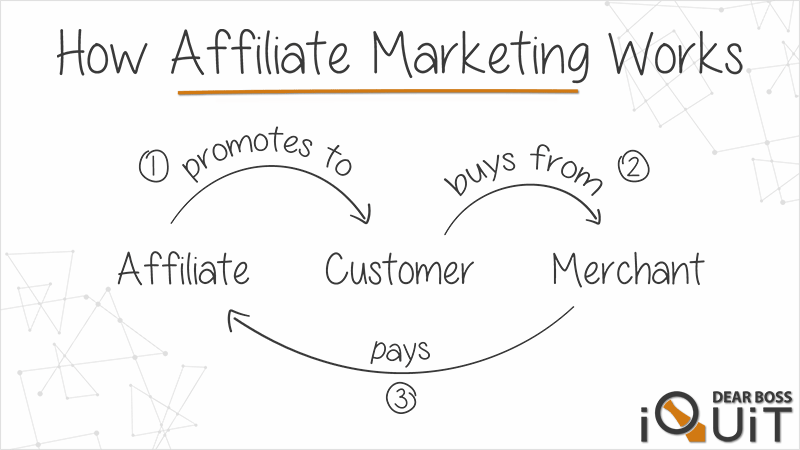“Affiliate marketing is a pyramid scheme!”
Such rumors have been circulating the web for years… Are they true though?
If you’re wondering the same thing, you’re in the right place!
This article is dedicated to revealing to you all the information you might need to fully understand whether affiliate marketing is a pyramid scheme or a legit money-making model that’s actually worth your time and attention or not.
Let’s take a closer look.
Affiliate marketing is not a pyramid scheme. Whoever claims otherwise has no clue about either what affiliate marketing or what pyramid schemes really are. Yes, some aspects of the two might seem similar but they have literally nothing in common.
To fully understand why affiliate marketing isn’t a pyramid scheme, you need to get a solid grasp of exactly how affiliate marketing and pyramid schemes really operate…
Best Affiliate Marketing Courses
Best Affiliate Courses
What is Affiliate Marketing?
Simply put, affiliate marketing is the process of earning commissions for promoting products and/or services created and distributed by another company or individual to potential retail customers.

Here’s an overview of the typical steps involved in the process of utilizing affiliate marketing:
- You sign up to a merchant’s affiliate program
- The merchant gives you a unique affiliate link that points to their online store
- You share your affiliate link with your audience via a blog, YouTube channel, social media group, etc
- When someone (let’s call him “John”) clicks on your affiliate link he’ll be sent to the merchant’s online store
- The merchant recognizes that John landed on their online store after clicking on your affiliate link
- If John makes a purchase on the merchant’s online store, the merchant will pay you a commission
What is a Pyramid Scheme?
A pyramid scheme is a money-making opportunity in which the only way to actually make a profit is by getting other people to purchase some kind of sign-up kit that would allow them to enroll in the scheme themselves.
Eventually, recruiting more people in a pyramid scheme becomes impossible, most new recruits are unable to make a profit, and the pyramid scheme starts going on a downward trajectory until it collapses on itself.
That’s exactly why pyramid schemes have been deemed illegal in most countries.
If the money you make is based on the number of people you recruit and your sales to them, it’s not legit. It’s a pyramid scheme. Pyramid schemes are illegal, and the vast majority of their participants lose money.
– Federal Trade Commission
The video right below explains exactly what pyramid schemes are and how they operate.
Affiliate Marketing vs. Pyramid Schemes
According to a report published by the FTC, all pyramid schemes exhibit one or more of the following 5 red flags:
- Endless chain of recruiting
- Larger downline = more success
- Ongoing purchases “Pay to Play”
- Overrides paid to 5+ distributor levels
- Upline profits >= distributor profits
Affiliate marketing, on the other hand, doesn’t display any of the aforementioned characteristics.
Let’s take a closer look…
1. Endless Chain of Recruiting
Making profit in a pyramid scheme involves an endless chain of recruiting other people, who will, in turn, recruit more people who’ll be recruiting even more people, and so on.
As such, a pyramid scheme can be easily labelled as the perpetual process of recruiters selling to other people the ability to become recruiters for the actual pyramid scheme itself.
On the contrary, affiliate marketing doesn’t involve any kind of recruiting whatsoever…
No affiliate merchant will ever reward you for convincing another person to sign up as their affiliate but rather for promoting their actual products and/or services to retail consumers that might be interested in purchasing them.
2. Larger Downline = More Success
In pyramid schemes, rank advancement, size of income, and bonus qualifications are primarily dependent not on retailing products but rather on downline recruiting.
As such, pyramid scheme participants tend to spend no time and effort retailing, except maybe for token sales to satisfy “retail rules” that might be prerequisites to earning some kind of bonus or reaching a specific rank.
Again, affiliate marketing involves no recruiting, no downlines, no rank advancements, and no recruitment bonuses…
The only factor that determines the size of income generated by an affiliate marketer is the amount of paying customers they refer to the online retailers they’re affiliated with.
3. Ongoing Purchases "Pay to Play"
Another defining characteristic of a pyramid scheme is “Pay to Play”.
Pay to Play refers to incentivized purchases (often by subscription) required to join and advance in the hierarchy of an organization.
Examples of Pay to Play include, but are not limited to:
- Mandatory entry fees
- Additional monthly purchases of products, services, training, etc. to maintain an active status and/or qualify for certain bonuses & rank advancements
Unlike pyramid schemes, 99.9% of all affiliate programs out there are completely free to join and involve zero ongoing expenses.
Any money-making model that doesn’t involve sign-up fees and incentivized repeated purchases can never be considered a pyramid scheme.
4. Overrides Paid to 5+ Distributor Levels
According to the FTC, an opportunity that pays its distributors overrides (commissions & bonuses) in a hierarchy of more than five levels is a pyramid scheme.
Affiliate marketing involves no recruiting, no downlines, no levels, and no overrides… Affiliate marketers get paid commissions only on a single level – on the retail sales they personally generate.
5. Upline Profits >= Distributor Profits
Last but not least, a red flag signaling an illegal pyramid scheme is when the total commissions paid by a company to a distributor per retail sale are much smaller than the overrides paid to said distributor’s upline.
For instance, if a distributor’s upline gets paid $20 more per retail sale than the actual distributor (including incentives, group bonuses, discounts, etc.) then you’re looking at a pyramid scheme.
This red flag doesn’t apply to affiliate marketing as it involves no recruiting and no upline payouts.
Affiliate marketing FAQs
Affiliate marketing is an online business model that involves promoting products or services created and distributed by third-party online merchants in exchange for getting paid a commission for each sale you refer.
In layman’s terms, affiliate marketing is the process of being compensated for helping businesses sell to more customers.
Here’s a bird’s eye view of how affiliate marketing works.
- You join a merchant’s affiliate program
- The merchant gives you a unique affiliate link that points to their e-shop
- You promote your unique affiliate link online (blog, forums, social media, paid ads, etc.)
- Every time someone clicks on your unique affiliate link and makes a purchase on the merchant’s e-shop, the merchant pays you a commission
There are thousands of successful affiliate marketers all around the world. Some of the most well-known ones are:
- Pat Flynn
- Matt Diggity
- Matthew Woodward
- Doug Cunnington
- & more
You can check out a roundup of my 17 favorite examples of affiliate success and their backstories right here.
- Billion-dollar industry
- Very low startup & operational expenses
- Huge income potential
- Flexible & versatile
- Passive income
- Simple to implement
- No technical background
- No customer support
- No physical setup
Affiliate marketers can be divided into five main income groups:
- Total beginners: $0 – $20,000 per year
- Low-level affiliates: $20,000 – $50,000 per year
- Intermediate affiliates: $50,000 – $100,000 per year
- High-level affiliates: $100,000 – $500,000 per year
- Super affiliates: $500,000+ per year
According to PayScale, the average annual income for affiliate marketers in the US is over $54,000 per year. Statistics reveal that 13% of affiliates earn more than $75,000 per year.
Some of the factors that influence how much you earn as an affiliate marketer include:
- seniority
- target niche
- available resources
- previous experience
- marketing efforts
- & overall mindset
Here’s a rough income growth timeline of a typical affiliate marketing business:
- months (0-3): no earnings
- months (3-6): first affiliate sale
- months (6-12): $100-$500 monthly
- months (12-18): $1000 monthly
- months (18-24): $3000+ monthly
This timeline isn’t a guarantee of future performance but rather a mere approximation of the income growth of an average affiliate business. Your own timeline could be shorter or longer than projected.
Over the years, I’ve seen aspiring affiliates striking a gold vein just a few months into the industry. On the other hand, I personally know people who’ve been struggling to grow their affiliate revenue to $1000 per month for several years.
Affiliate marketing is one of the most affordable money-making models out there.
Here’s a breakdown of everything you need to get started as an affiliate marketer along with their associated costs:
- web hosting & domain name: $2.95/month (Bluehost)
- keyword research tool: $49/month (Jaaxy)
- expert guidance: $49/month (Wealthy Affiliate)
- email autoresponder: Free for up to 1000 subs (MailerLite)
Please note that on top of expert guidance, Wealthy Affiliate also provides free access to hosting and a keyword research tool so you don’t have to purchase them separately.
Yes, you can do affiliate marketing without a website by promoting your affiliate links on other marketing channels, such as:
- Social Media
- Paid Ads
- YouTube
- Podcast
- etc.
The process of getting started with affiliate marketing can be broken down into the following four simple steps:
- Pick a niche
- Launch a blog
- Build an audience
- Promote affiliate products
No, you don’t.
Affiliate marketing is very simple to get started with by virtually anyone regardless of age, education, background, available capital, tech-savviness, professional network, etc.
In fact, most 6-figure affiliate marketers were no more experienced than you currently are when they first ventured into the affiliate marketing industry.
Nonetheless, being knowledgeable in fields like marketing, sales, content production, business management, etc., could help you reach your financial goals somewhat faster.
Conclusion
Affiliate marketing doesn’t exhibit any of the defining characteristics of pyramid schemes…
First, it doesn’t involve any recruitment whatsoever. Secondly, affiliate success depends on actual retail sales not building a downline.
Also, unlike pyramid schemes, 99.9% of all affiliate programs out there are completely free to join and involve zero ongoing expenses.
Lastly, affiliate marketers don’t get paid based on the sales of other affiliate marketers but rather only on the retail sales they personally generate.
Having said all that, affiliate marketing is NOT a pyramid scheme.
Frankly, whoever thinks otherwise has no clue about either what affiliate marketing or what pyramid schemes really are.
The two models have literally nothing in common.
Have any questions?
Leave a comment right below or contact me right here.
I’ll be more than happy to help you out!
All the best,
Harry, Founder & Editor at dearboss-iquit.com




